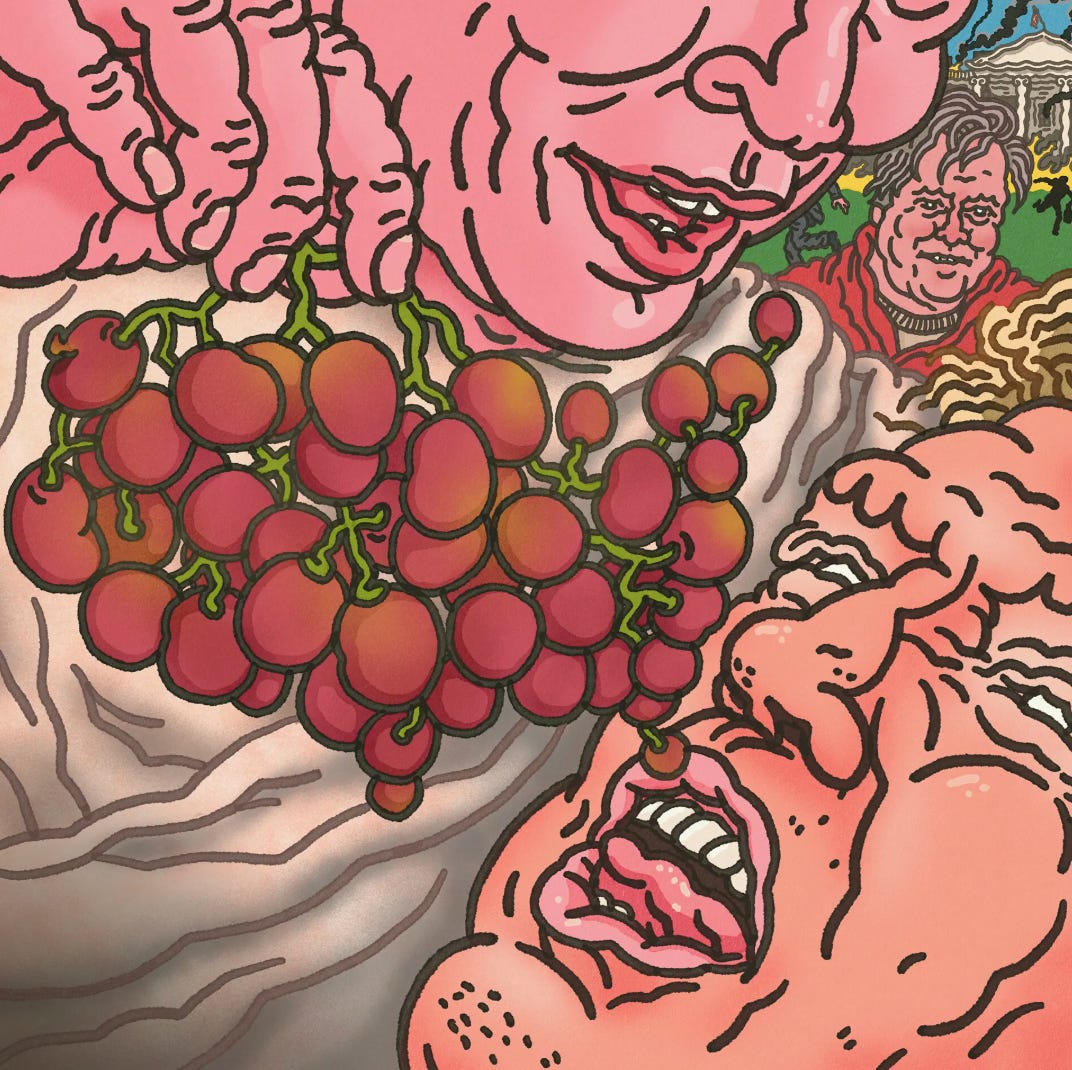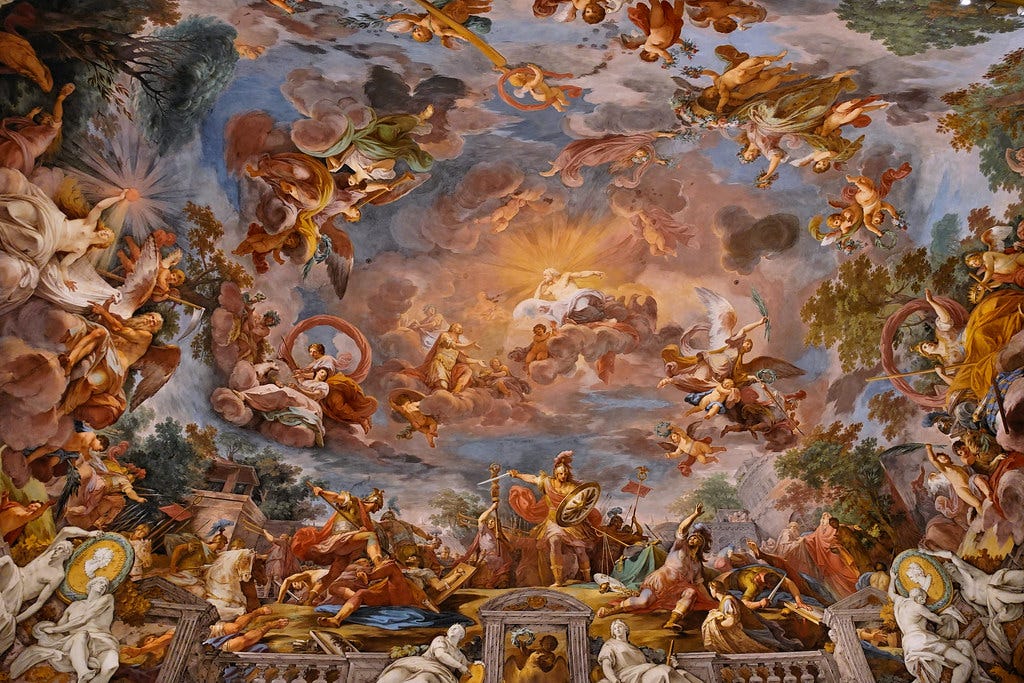So, Elon Musk has named his latest son Romulus. Not only should this seriously concern X Æ A-12, it also marks another step in Musk’s journey of dubious Romanisation.
First, he was musing, as no man has mused before, about whether the Romans might have come from Troy. Then, he declared himself Imperator of Mars. Now AI is bringing us a deluge of increasingly uncanny images of Musk as a gladiator-emperor hybrid.
None of this is surprising. Rome is woven into Western imagery of masculinity and power; it seems natural that it should appeal to Musk — as it has to better (and worse) men before him.
More interesting than Musk’s veneration of Roman glory is his interest in her decline. He and other figures of the MAGA right — J. D. Vance, Steve Bannon, Michael Anton, Curtis Yarvin — have begun to talk grimly of the fall of Rome, invoking ancient stories of degeneration and collapse to craft political agendas in the present.
These comparisons are often tenuous at best (as are the equivalent analogies that have been made on the left), but their import is substantive: they are being used to justify calls for extraordinary, and often unconstitutional, political measures. I wrote about the strikingly Roman tenor of their arguments earlier this month in the New York Times.

In blaming plummeting Roman birthrates or corrupting spirals of moral degeneration for the fall of the Roman republic and later the empire, Musk et. al. are advocating theories which have been largely debunked by modern scholarship. But they are also repeating, almost verbatim, arguments made by the Romans themselves.
“What the right has captured is a tradition established by the Romans themselves, creating an uncanny hall of populist mirrors that reflect millenniums-old contortions into our present. Even as Rome grew into a lush hegemony, the Romans spoke constantly of decline, danger and crisis. The historian Sallust attributed the political convulsions of the late republic to the vices he believed had spread through Rome like a “deadly plague.” A few decades later, Livy complained that the Romans of his day could “endure neither our vices nor their cures.” Toward the end of the second century B.C., the Gracchi brothers claimed to have seen Italian fields empty of Italian peasants — the good stock who had built Rome’s success were dying out because they could no longer afford to raise families. Nearly 250 years later, the satirist Juvenal complained that rich, vain, selfish women were having abortions to avoid carrying children.”
But if disaster was coming, if moved remarkably slowly. We find the same rhetoric of imminent collapse repeated over some seven hundred years of Roman history — primarily, I argue, because it was politically useful.
“The narrative of decline allowed politicians throughout Rome’s history to claim that Rome simultaneously was the greatest civilization on Earth and was in the sort of grave political crisis that required extraordinary and often unconstitutional political intervention.”
Is Rome — that strange mirror that has flattered and horrified every Western empire that has risen in its wake — being used to make the same arguments to the same ends today?
I’d love to know what you think in the comments and if you’d like to read more, you can find the full article here.
And a brief note on the name Romulus…
On January 16th 27 BC, a man named Lucius Munatius Plancus stood up in the Senate House and proposed that Octavian — heir of Julius Caesar, victor in the civil war against Mark Antony, and the man who was becoming Rome’s first emperor — should henceforth be known by the honorific name “Augustus”. For some, this is the moment at which Rome transitions beyond all reasonable doubt from republic to autocracy.
Plancus made his suggestion as though it was a spontaneous one, but everyone knew it had been choreographed by the regime. For months, Octavian and his advisors had been discussing what sort of moniker would befit his new status. Octavian himself, it was said, had wanted to take nothing less than the name of Rome’s founder and first king — Romulus.
Here was a name, Octavian felt, that encapsulated the role he was building for himself. He planned to be the founder of a new Roman age; to usher in a golden era that would rival the legendary virtue and valour of her earliest history.
His advisors baulked. Romulus had founded Rome as a monarchy; if Octavian took his name, he would be veering dangerously close to calling himself king. Rex was a hated word in Rome and part of Octavian’s genius lay in the fact that he accrued all the powers of an autocrat without ever admitting he was anything but the first among equals. Romulus was a name that would set alarm bells ringing.

Octavian relented. He would not be Romulus. Still, any well-read Roman would have recognised that the name he chose alluded to the city’s legendary founder. There was a famous line in Ennius’ Annals — an epic historical saga by the man considered father of Roman poetry — that described how Romulus had founded Rome with “august augury”. In 27 BC, this is the first reference the name “Augustus” would have called to mind.
The comparison was a less explicit one than Octavian had planned. But still the name of Romulus, founder and king, floated behind his promise of Rome’s revival — and behind the beginning of her autocratic turn.


Thank you for this thought-provoking article. I personally find ancient history fascinating and it bothers me that none of these dude-bros seem to know that other (arguably more impressive) empires/regimes/mythological figures existed. Like why not name your kid Ashurbanipal or Quetzalcoatl?? Lol.
Great post! I would argue that many of these contemporary arguments for decline were motivated by cultural changes and the perceived corruption of traditional Roman values (mos maiorum) caused by the acquisition of the provinces and the transition to Empire. Cultural assimilation, particularly the effect of Hellenization, led many to feel they were genuinely losing something of the old Rome. Augustus’ social legislation was designed to arrest these changes, particularly among the upper classes. The decay was a slow process, and Rome’s military and economic might allowed it to endure for centuries. Still, few would argue that the Rome of late antiquity possessed anything close to the social cohesion of the republican period. While I do think there are some parallels to our current situation, I agree with you that many making such comparisons today do so primarily for political effect.